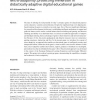Free Online Productivity Tools
i2Speak
i2Symbol
i2OCR
iTex2Img
iWeb2Print
iWeb2Shot
i2Type
iPdf2Split
iPdf2Merge
i2Bopomofo
i2Arabic
i2Style
i2Image
i2PDF
iLatex2Rtf
Sci2ools
JCAL
2010
2010
Micro-adaptivity: protecting immersion in didactically adaptive digital educational games
The idea of utilizing the rich potential of today's computer games for educational purposes excites educators, scientists and technicians. Despite the significant hype over digital gamebased learning, the genre is currently at an early stage. One of the most significant challenges for research and development in this area is establishing intelligent mechanisms to support and guide the learner, and to realize a subtle balance between learning and gaming, and between challenge and ability on an individual basis. In contrast to traditional approaches of adaptive and intelligent tutoring, the key advantage of games is their immersive and motivational potential. Because of this, the psycho-pedagogical and didactic measures must not compromise gaming experience, immersion and flow. In the present paper, we introduce the concept of micro-adaptivity, an approach that enables an educational game to intelligently monitor and interpret the learner's behaviour in the game's virtual ...
| Added | 19 May 2011 |
| Updated | 19 May 2011 |
| Type | Journal |
| Year | 2010 |
| Where | JCAL |
| Authors | Michael D. Kickmeier-Rust, Dietrich Albert |
Comments (0)

